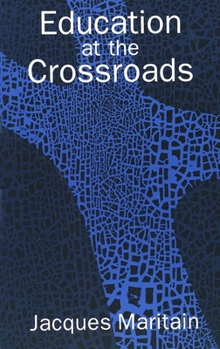Education at the Crossroads
Select Format
Select Condition 
Book Overview
"A document of first-rate importance. . . . Sheer informed common sense. . . . This volume should be compulsory reading for all, whatever their religious beliefs or disbeliefs, who want light on the nature and place of education in our democratic society."--The Yale Review One of the most eminent Catholic philosophers of our time explores the American system of education. Jacques Maritain believes that education must be based...
Format:Paperback
Language:English
ISBN:0300001630
ISBN13:9780300001631
Release Date:September 1960
Publisher:Yale University Press
Length:130 Pages
Weight:0.30 lbs.
Dimensions:0.6" x 5.0" x 7.9"
Customer Reviews
1 rating
Education at Crossroads
Published by Thriftbooks.com User , 15 years ago
For an encouraging and substantial discussion of education, turn to a book published fifty years ago: Jacques Maritain's Education at the Crossroads (New Haven: Yale University Press, c. 1943). If only we had a truthful understanding of human nature and society, he thinks we might more effectively design healthy educational systems. Here Maritain writes prophetically: "The task of moral re-education is really a matter of public emergency. . . . . That teachers in public schools may not face unruliness and violence, moral authority must be recognized; and there must be a serious teaching of moral principles, I mean as grounded on truth rather than as suitable to social convenience" (p. 93). The "present agony of the world," he believed, is "a supreme crisis of the Christian spirit, which for a long time has been neglected or betrayed in democracies, and which totalitarian states are now determined definitely to abolish, then it is obvious that a revival of Christian conscience and a new work of evangelization are the primary and unquestionable conditions for the moral re-education that the man of our civilization needs" (p. 107). Maritain begins by insisting we set forth coherent "aims of education" which gives order and direction to our endeavors. "Education is an art," he says, "and an especially difficult one" (p. 2). Thus it demands we have artful designs with clear objectives (or ends) in mind. It is an "ethical art" which truly seeks to free persons to attain the end for which they are created. As practitioners of the art of teaching, teachers are more like farmers or doctors than sculptors. There must be an attentiveness to the nature of the person, an ars cooperativa naturae (art cooperating with nature), a genuine ministering to the learner which characterizes good teaching. At this point he cites some wise words from his master, St Thomas Aquinas, who urged students: "'Always make sure that you actually understand what you read or listen to,'" and "'avoid speechi¬fying on anything whatsoever.'" To both teachers and students, Aquinas said: "'never leave behind him any difficulty unsolved.'" "He also warned teachers--this advice was already necessary for the educators of his time--'never to dig a ditch that you fail to fill up.' He knew that to raise clever doubts, to prefer searching to finding, and perpetually to pose problems without ever solving them are the great enemies of education" (p. 50). Above all else, education should encourage the development of moral reasoning, virtuous living, qualities of mind and character which, we early discover, cannot be mechanically inscribed in the young. Facts can, at least momentarily, be poured in. Data can be inscribed in computers. Our young people have often acquired lots of facts. But they know little about the soul, the life of the spirit, the moral dimension to life, the life of freedom. Moral persons, of course, are necessarily free persons who




